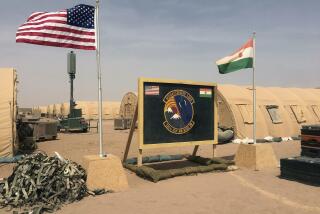W. Africans to Consider Return to Sierra Leone
- Share via
WASHINGTON — With the Clinton administration offering economic and technical support, West African leaders agreed Tuesday to consider sending a Nigerian-led military force to restore order in Sierra Leone, a step that would amount to a vote of no confidence in beleaguered U.N. peacekeepers.
In a communique issued after a meeting in Nigeria, representatives of nine African countries called for a meeting next week of the region’s military and defense chiefs to discuss sending back to Sierra Leone the West African force that was replaced last month by the U.N. troops.
U.S. officials pledged Air Force jet transports and other logistical support and indicated that Washington would relieve at least part of the financial burden that Nigeria shouldered during most of the earlier intervention by the West African force.
Nigerian President Olusegun Obasanjo presided over the one-day meeting in Abuja, his nation’s administrative capital. Ahmad Tejan Kabbah, the elected president of Sierra Leone’s embattled government, attended, as did the presidents of Ivory Coast, Guinea, Mali and Togo. Burkina Faso, Ghana and Liberia sent ministers.
Meanwhile, British troops evacuated about 300 foreigners--most of them citizens of Britain and its European Union partners--from Freetown, the increasingly tense capital of Sierra Leone.
Late Tuesday, a U.N. spokesman announced that U.N. troops had been forced to withdraw from the town of Masiaka, about 40 miles east of Freetown, after coming under fire from unidentified gunmen. It was a fresh humiliation for the 8,700-strong force, which is missing about 500 soldiers and personnel who apparently were detained in recent days by guerrillas loyal to rebel leader Foday Sankoh.
Critics say the U.N. force, made up of troops from Nigeria, Kenya, Ghana, India, Guinea, Jordan and Zambia, is poorly trained and ineffectively led. Like all U.N. peacekeeping contingents, it was assembled by Secretary-General Kofi Annan’s staff from troops made available by member governments.
“The record of U.N. peacekeeping operations shows there has to be one country that takes the lead,” said Pauline Baker, president of the Fund for Peace in Washington. “With one clear leader, you have a unified chain of command and a unified mission. You have to have equipment that works and is suitable for the mission. The U.N. force in Sierra Leone is outgunned and outmanned by the rebels.”
But Baker said the problems faced by the U.N. force stem mostly from a growing peacekeeping fatigue affecting governments around the world.
“Most of the warlords and those who want to take over countries for their own reasons know the world is weary of peacekeeping,” she said. “When tested, the international community won’t step up to the plate. Sankoh knew that.”
Although U.S. officials were guarded in public criticism of the U.N. troops, they welcomed the prospect of returning the Nigerian-led force.
After Tuesday’s meeting in Abuja, a Clinton administration official who requested anonymity said the U.S. supports the West African leaders and is “willing to provide logistical support” and work with the United Nations on coordinating the movement of the African and U.N. forces.
The West African summit issued a sharp condemnation of Sankoh’s Revolutionary United Front. The leaders vowed to resist attempts to take over Sierra Leone by undemocratic means. And they warned that Sankoh and his followers risk losing a general amnesty they won in a U.S.-mediated peace agreement signed in July that gave Sankoh a role as a minister in the government.
Meanwhile, Sankoh reportedly was missing after protesters and his bodyguards clashed at his home in Freetown on Monday.
The nine nations whose leaders met Tuesday form the core of the 15-nation Economic Community of West African States, which sponsored the Nigerian-led force known as the Economic Monitoring Group, or ECOMOG. The communique called for a meeting of defense ministers and chiefs of staff of the community nations next Wednesday in Abuja.
Nigeria spent about $4 billion of its own money in maintaining the ECOMOG force, which battled Sankoh’s rebels for much of Sierra Leone’s eight-year civil war. After the peace agreement was signed in July, the force provided basic security until it was withdrawn last month. The peace broke down as soon as the Nigerians left.
Obasanjo, who was elected last year, pledged to withdraw from Sierra Leone to end the drain on his country’s treasury. Nigerian officials have made it clear that they will not send back their troops unless the West is prepared to pay most of the bill.
During their long deployment, the ECOMOG troops became the stand-in army of the government of Sierra Leone instead of acting as neutral arbitrators, the role adopted by the United Nations. Nigerian troops were often criticized for using excessive force and were sometimes accused of human rights abuses. However, even more brutal tactics were used by the rebels, who often hacked off the hands and arms of civilians thought to be sympathetic to the government.
Some Sierra Leoneans reportedly want the Nigerians to return, believing that unlike the U.N. peacekeepers, they can and will fight.
In London on Tuesday, the Defense Ministry announced that, without incident, British troops had escorted British and other European civilians from Sierra Leone to Dakar, the capital of neighboring Senegal.
A spokesman could not say how long the evacuation would continue.
“It depends how many more people decide they want to crawl out of the woodwork,” the spokesman said. “If things in Freetown remain calm, there will be fewer people wishing to leave. As soon as the situation deteriorates again, there will be more wanting to get out.”
Kempster reported from Washington and Simmons from Johannesburg, South Africa. Times staff writers Marjorie Miller in London and John J. Goldman at the United Nations contributed to this report.
More to Read
Sign up for Essential California
The most important California stories and recommendations in your inbox every morning.
You may occasionally receive promotional content from the Los Angeles Times.














